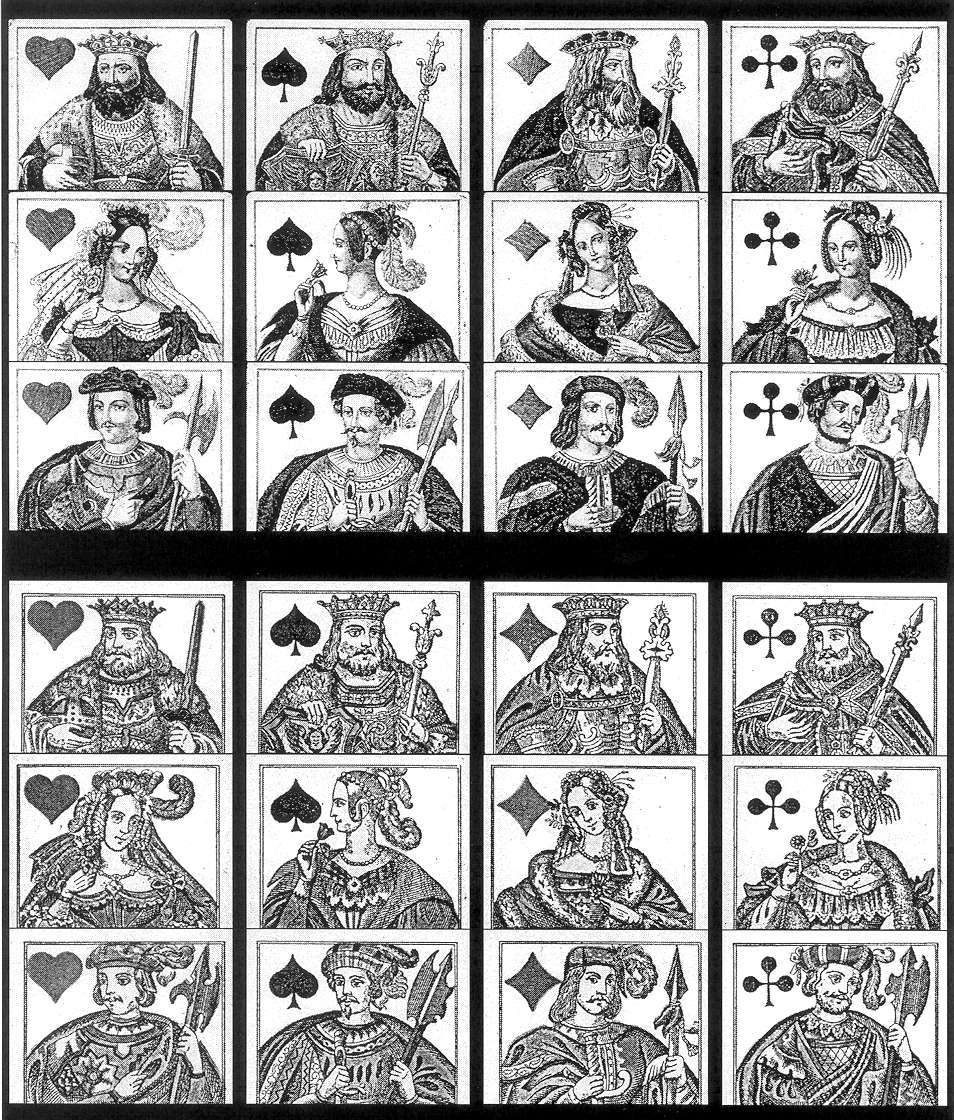

| Suit System: | F |
| Recommended Name: | no recommended name. |
Formerly labelled F-1.53 and XP5 (XP for eXpatriate Paris). Turnhout makers in the late 19th century called their standard version of the pattern "Cartes Italiennes" for no obvious reason. There was also a version with large-headed courts called "Cartes Mogul".
Production started probably around 1850; one example from Switzerland has been dated as c.1860. Very few examples have the maker's name, especially the better-executed ones that presumably stem from Germany. Turnhout seems to have been a major producer of this pattern, continuing up till about 1900 when its popularity may have been overshadowed by that of a derivative apparently aimed at the Paris market. Many features of the designs are strongly reminiscent of [IPCS #71], but this one introduces the feature of the angular shield, which proved to be a potent design influence. Without the references to [IPCS #71] the connection with the prototype would seem remote.
Usual XP format (i.e. with
a horizontal dividing line). As usual for the XP group, it is the four Kings
that define the pattern, the Kings bearing the harp and the (angular) shield
being the most important. The pattern is particularly prone to suit-swapping,
but one of the more constant features is that it is usually
K![]() who holds the shield, and
K
who holds the shield, and
K![]() who holds the harp - which is a not very credible shape. Enough of the top portion of the angular shield is visible
to show that it sports a decoration of a winged human or monstrous head.
K
who holds the harp - which is a not very credible shape. Enough of the top portion of the angular shield is visible
to show that it sports a decoration of a winged human or monstrous head.
K![]() holds an orb and sword
(sometimes a sceptre) as in the prototype, while
K
holds an orb and sword
(sometimes a sceptre) as in the prototype, while
K![]() often wears armour under
his cloak, fastened
by a strap across his breast.
often wears armour under
his cloak, fastened
by a strap across his breast.
The Queens are not royal,
but ladies with fashionable coiffures of the Biedermeier period decorated with
feathers etc. One, usually Q![]() ,
is often in profile holding a
tulip, as in the prototype. Wüst made a version with unusual Queens posed
against backgrounds. Biermans also made versions with Queens more typical of
the later "Cartes Parisiennes".
,
is often in profile holding a
tulip, as in the prototype. Wüst made a version with unusual Queens posed
against backgrounds. Biermans also made versions with Queens more typical of
the later "Cartes Parisiennes".
The Jacks carry halberds,
but J![]() usually has a
tasselled spear instead. J
usually has a
tasselled spear instead. J![]() still holds the edge of his cloak as in the Paris prototype;
J
still holds the edge of his cloak as in the Paris prototype;
J![]() and J
and J![]() are holding
sword-hilts; J
are holding
sword-hilts; J![]() has his free
hand out of sight, like J
has his free
hand out of sight, like J![]() of [IPCS #71]. Suit-swapping sometimes occurs.
of [IPCS #71]. Suit-swapping sometimes occurs.
King, Queen, Jack and numerals; usually 52 cards. Packs often have scenic aces.
Schweizer Spielkarten #114 by B. Schaer (c.1860)
has K![]() with the harp and
K
with the harp and
K![]() with the shield.
Turnhoutse Speelkaarten items 37-40 are typical
"Cartes Italiennes" by various makers. #36 by Biermans has a mixture
of features. The Cary catalogue has examples at BEL 29, GER 126-129, and SWI 7
(all anonymous). See also Spielkarten aus Goslar #F 14.
with the shield.
Turnhoutse Speelkaarten items 37-40 are typical
"Cartes Italiennes" by various makers. #36 by Biermans has a mixture
of features. The Cary catalogue has examples at BEL 29, GER 126-129, and SWI 7
(all anonymous). See also Spielkarten aus Goslar #F 14.
Louis Jassoy, Hanau c.1860;
C. L. Wüst, Frankfurt a/M;
Veuve Sonet-Morin, Paris c1850;
J. Müller, Diessenhofen - with the Queens typical of [IPCS #71];
Frommann & Morian, Darmstadt.

| Top three Rows: | Anonymous (possibly German); fine quality with scenic aces of Switzerland. |
| Bottom three Rows: | Mesmaekers,
Turnhout; good quality, colourfully printed, with Swiss scenic aces, and wrapped as Cartes Superfines. |
| The International Playing-Card Society | 8/2001 JB |